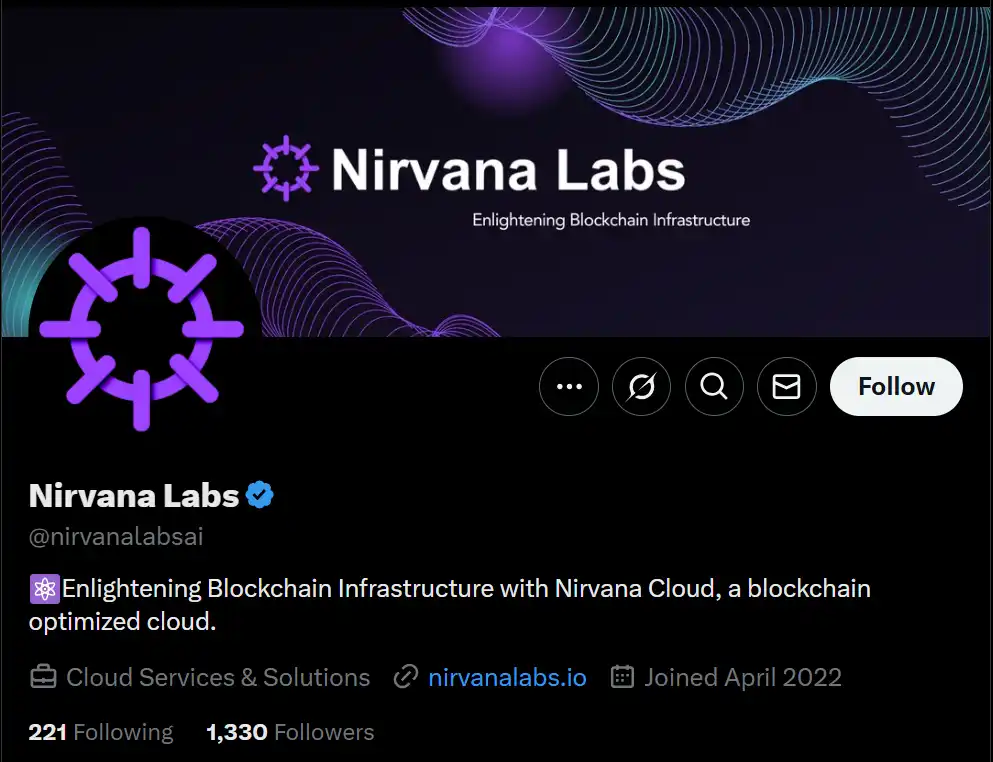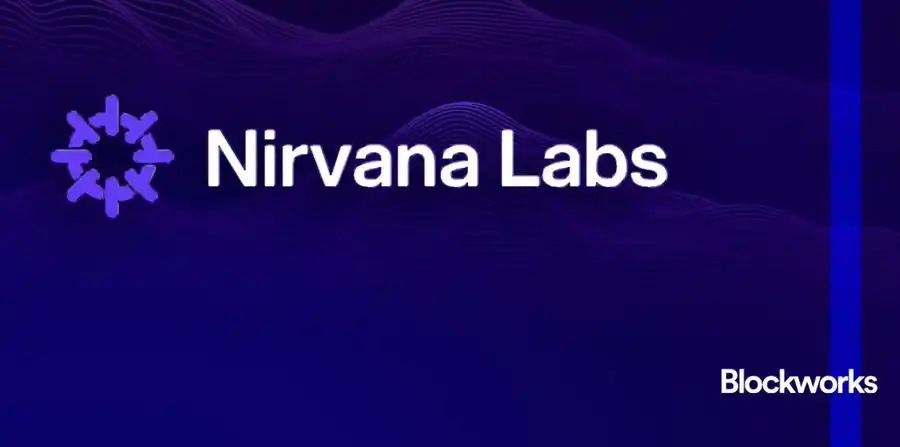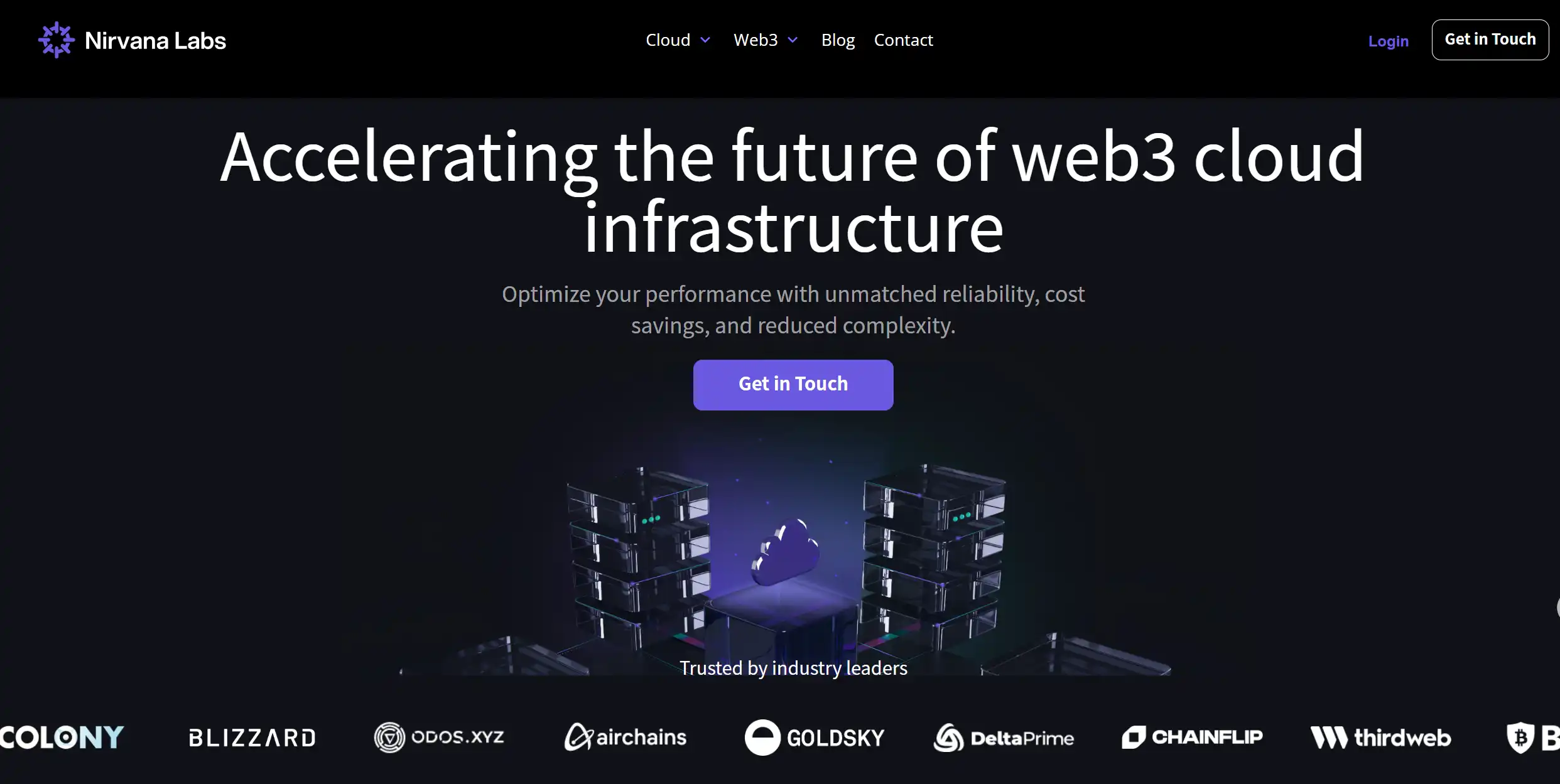Recently, as Bitcoin returned to $100,000, the overall market sentiment has surged again, and projects are sprouting up like mushrooms after rain, with DeFi, cross-chain protocols… emerging one after another, while the "foundation" supporting these applications—blockchain infrastructure—is quietly upgrading.
On May 13, according to Blockworks, blockchain cloud service company Nirvana Labs completed a $6 million seed extension round of financing, led jointly by Jump Crypto and Crucible Capital, with participation from RW3 Ventures, Castle Island, Hash3 VC, and others.
Can Nirvana Labs shake up traditional cloud giants?
Nirvana Labs is a company focused on blockchain cloud services, having developed Nirvana Cloud, a cloud infrastructure specifically designed for Web3 applications.

Unlike traditional AWS and Google Cloud, Nirvana offers high-performance, low-latency, low-cost "bare metal" cloud computing services—simply put, it provides Web3 projects with a more tailored and powerful "dedicated host."
Nirvana Labs operates in the blockchain infrastructure space, specifically providing cloud computing services for Web3, which is a key component of blockchain infrastructure. The target users are clear: on-chain high-frequency trading teams, dApps developers, validator node operators, Web3 data service companies, and even blockchain foundations, among others.
Why is this space important? Because traditional cloud services are increasingly struggling in a blockchain environment: on one hand, there are high costs, and on the other, inefficient performance. The needs of Web3 projects are quite the opposite—they crave extreme performance and cost-effectiveness.
From an industry perspective, blockchain infrastructure projects are currently in an explosive growth phase, directly driving demand for foundational services. Nirvana Labs also intends to capitalize on this wave of benefits—according to them, more and more Web3 projects are transitioning from traditional cloud services to dedicated bare metal solutions like Nirvana to reduce costs and improve performance.
Interestingly, although Nirvana currently provides centralized cloud services, this does not contradict the decentralized philosophy of Web3. On the contrary, it offers a "realistic path to transition to decentralization," building a more stable foundation for the entire ecosystem while ensuring performance.
How fast is Nirvana Labs growing?
Founded in 2022, in just over two years, the company has already supported more than 60 blockchain networks, covering both EVM and non-EVM chains. The client roster is impressive, including well-known projects like Chainlink, Avalanche, BitGo, Thirdweb, Xai, Berachain, and more.

In 2024, the company's revenue skyrocketed by 650%, with monthly transaction volume maintaining a 152% month-over-month growth. By May 2025, they completed another round of $6 million in seed extension financing, bringing the total financing amount to $11.8 million.
This round was co-led by Jump Crypto and Crucible Capital, with RW3 Ventures, Castle Island, Hash3 VC, and other existing shareholders continuing to invest, indicating that Nirvana Labs is well-recognized in the capital market.
The golden partnership of "technology + business"
The company was co-founded by Dan Burke and Devin Bandara, one of whom understands market implementation while the other understands underlying architecture, making them a typical "technology + business" golden duo.
From BitGo to Nirvana, infrastructure veterans embark again
Dan is the CEO of Nirvana Labs and previously served as the head of the Asia-Pacific region at BitGo and Qredo, with over 7 years of experience in blockchain infrastructure. He understands both technology and how to push services to global customers. During his time at BitGo, he dealt with multiple large node services and exchange-level deployment issues, gaining a deep understanding of how to optimize high-intensity blockchain loads.
In his view, traditional cloud computing is holding back Web3—it's too expensive, too slow, and not flexible enough. Nirvana Labs' bare metal solution is designed to "help Web3 applications break free from 'cloud dependency' and use truly compatible cloud services."
Product-driven geek CTO
Co-founder Devin Bandara is a tech enthusiast focused on the underlying architecture design and product roadmap of Nirvana Cloud, adept at using technology to solve practical problems. Devin places great emphasis on balancing performance and cost—ensuring that Web3 users do not go bankrupt while also not sacrificing performance to save money.
He has stated, "Web3 applications have unique operating methods, but most cloud services are still using Web2 logic to serve Web3, which simply doesn't work." Under his leadership, Nirvana Cloud has gradually evolved into a cloud system truly optimized for on-chain loads.
Nirvana Labs' team structure is also quite robust, with members primarily coming from top Web3 companies like BitGo and Qredo, including many engineers and architects with years of experience in cloud infrastructure. This team combination offers both the agile speed of blockchain and the stable foundation of cloud services.
The board also includes heavyweight advisors, such as Joe Bruzzesi, a general partner at RW3 Ventures, who previously served as the head of the Americas at BitGo, providing stable guidance for Nirvana's business strategy.
Continuous capital injection, confidence rising
Whether or not you can secure funding often indicates how the industry and capital market view you.

In March 2024, Nirvana Labs completed a $1.7 million pre-seed round of financing, led by RW3 Ventures, with participation from well-known institutions such as Raptor Group, Blizzard Fund (Avalanche ecosystem fund), Hash3, Lattice Fund, QCP Capital, and others. Even industry OGs like Nansen founder Alex Svanevik and Etherscan founder Matthew Tan invested, indicating strong early-stage confidence.
In July 2024, the company completed a $4 million seed round of financing, co-led by Castle Island Ventures and RW3 Ventures, with BitGo Ecosystem Fund, Hash3, Third Earth, and Play Ventures also joining the ranks.
In May 2025, Nirvana Labs secured another $6 million in seed extension financing, co-led by Jump Crypto and Crucible Capital, with existing shareholders RW3 Ventures, Castle Island Ventures, and Hash3 VC continuing to increase their stakes. To date, the company has raised a total of $11.8 million.
These funds are not for "hoarding" but are quickly being invested in global infrastructure expansion, optimizing access to more blockchain networks, and enhancing customer support services.
Web3 Native Cloud
Nirvana Labs does not follow traditional paths; they are not providing a pseudo Web3 cloud service that merely "wraps" Web2. Nirvana has optimized from the ground up for blockchain load scenarios to achieve "on-chain friendliness."
On Nirvana Cloud, each server is dedicated to a single client, ensuring no resource contention with others. This architecture is particularly suitable for compute-intensive tasks like block validation, transaction matching, and HFT—because you don't have to worry about a neighbor suddenly running an AI large model and monopolizing the CPU.
Although Nirvana is essentially still a centralized cloud platform, it does not rely on central clouds like AWS or Google, nor does it host critical components on them. This is important for Web3: many projects talk about decentralization while hosting critical services on Amazon Cloud, which can lead to a complete network failure if it goes down. Nirvana, at least in terms of "infrastructure sovereignty," stands on the side of Web3.
Nirvana supports EVM, non-EVM, L1, and L2. Whether you are working within the Ethereum ecosystem or with Solana, Aptos, or Cosmos, this platform can deploy nodes and RPC services with a single click. Compared to cloud solutions that can only serve a single chain, this cross-chain compatibility is clearly more suitable for developers in a multi-chain world.
Nirvana's clients are not limited to developers; they also include staking platforms, DeFi, data service providers (such as RPC providers), and even high-frequency trading teams.
No matter how good the story is, it must be backed by technology. Nirvana Labs' underlying platform—Nirvana Cloud—has delivered a solid answer.
Through customized bare metal servers and proprietary network channels, Nirvana provides industry-leading RPC and node services. For example, their node service for Ethereum guarantees 99.99% uptime, with latency low enough for high-frequency trading.
According to their published data, it is 19.5% cheaper than AWS and 26.91% cheaper than Google Cloud for the same configuration. Overall, cloud costs can be reduced by up to 85%. For early-stage projects with limited funding, this money can determine whether you survive or perish before the next bull market.
Currently, Nirvana Cloud has over 35 data centers worldwide, supporting on-demand elastic scaling of CPU, memory, and storage resources, flexible enough to accommodate various needs from small projects to large public chains. The entire technology stack of Nirvana emphasizes security from the design phase, adopting enterprise-level protection standards, making it very suitable for handling high-value on-chain tasks, such as wallet custody and cross-chain bridge validation nodes.
Through their dashboard, a new node can be set up in just a few minutes, with all performance monitoring and resource analysis clearly visible, saving a lot of command line and operational costs.
What is the product like now that it has been launched?
Nirvana Cloud has officially launched and is in use, handling billions of monthly calls for clients including Chainlink, Avalanche, Manta, and Xai. The product supports various key scenarios in blockchain infrastructure, including load-balanced RPC nodes, enterprise-grade dedicated nodes, and virtual machine management.
By simply registering an account on their official website (nirvanalabs.io), users can access their visual dashboard, which offers a relatively user-friendly experience:
- One-click deployment/management of nodes
- Customizable virtual machine performance
- Real-time monitoring of resource usage
- One-click restart/shutdown of services

In the future, they also plan to open up more self-deployed node features, such as allowing Ethereum nodes to operate independently of Nirvana management, further enhancing flexibility.
Victor Ji, co-founder of Manta, stated that at the critical moment of the mainnet launch, Nirvana provided "high availability + redundancy" infrastructure, ensuring stable node deployment. Lydia Chiu, Senior Vice President of Avalanche, also directly recognized Nirvana as an "efficient and scalable infrastructure service provider," a cloud platform that understands blockchain.
Whether for dApp project teams, on-chain service providers, or trading platform teams, they have concluded that Nirvana's dashboard is relatively easy to use and worry-free. Developers no longer need to struggle with complex command lines or set up nodes themselves.
Of course, Nirvana is not without its flaws; it remains a centralized cloud platform, which may not meet all the needs of projects pursuing "fully decentralized computing" (such as distributed computing networks like Fluence). Additionally, there is significant competitive pressure in the infrastructure field, and to maintain a long-term advantage, it will depend on their subsequent product refinement and market expansion capabilities.
Summary
Nirvana Labs is exploring a Web3 infrastructure route that does not rely on traditional giants like AWS, focusing on addressing the current shortcomings of cloud services in terms of latency, cost, and chain-native support. Its bare metal cloud platform has supported multiple on-chain projects, demonstrating certain performance and cost advantages.
The team consists of members with backgrounds in blockchain and cloud computing and has received multiple rounds of investment from well-known institutions, gaining a degree of industry recognition. Although the platform still operates on a centralized architecture, future expansion in decentralization capabilities and global deployment will be key challenges.
As the demand for high-performance infrastructure in Web3 applications grows, whether Nirvana can continue to expand its market share remains to be seen over time.
免责声明:本文章仅代表作者个人观点,不代表本平台的立场和观点。本文章仅供信息分享,不构成对任何人的任何投资建议。用户与作者之间的任何争议,与本平台无关。如网页中刊载的文章或图片涉及侵权,请提供相关的权利证明和身份证明发送邮件到support@aicoin.com,本平台相关工作人员将会进行核查。




